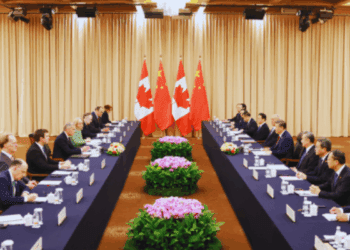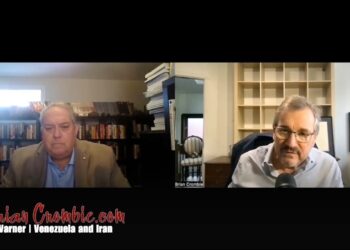In an op-ed in the Ottawa Citizen, Roger Robinson notes that with the passage of the Chinese cargo ship Yong Sheng through the Arctic it’s important for Arctic nations to understand China’s ambitions in the region. The piece is based on Robinson’s MLI commentary “China’s ‘Long Con’ in the Arctic” and argues that China is merely putting on a friendly face in its dealings with Arctic nations, in an effort to gain influence over natural resources and shipping lanes that are appearing in the melting Arctic ice.
China’s ‘long con’ in the Arctic must be countered
When the Yong Sheng concluded its voyage along the Northern Sea Route to Rotterdam Tuesday, it was the first Chinese cargo ship to travel from the Pacific Ocean to the Atlantic Ocean in this manner, saving thousands of kilometres in travel distance, compared to traditional routes.
Russian President Vladimir Putin has proclaimed that the Northern Sea Route will emerge as a direct rival to the Suez and Panama canals in the near future. China appears to agree; it stands to save between $60 billion to $120 billion US a year in trade-related costs by crossing through the Arctic.
And Beijing’s billions in cash infusions to Russia will likely overwhelm any naysayers in the Kremlin or military who suspect that its new friends will ultimately turn on Russia in its far east and perhaps elsewhere.
The passage of the Yong Sheng provides us with an overdue opportunity to scrutinize China’s long-term ambitions for the Arctic, and to consider what game it is we’re playing with the Asian giant.
Part of China’s strategy can be described with a term of art used in the confidence racket — the “long con.” This term is used when a con man (or entity) makes a sizable investment of capital, executive time and energy over an extended period to engage his victim’s (the mark’s) trust in order to achieve a far more valuable score at the end of the scheme.
In China’s case, being granted observer status at the May 2013 Arctic Council meeting in Kiruna, Sweden represented an important milestone in slipping into the tent of the leading governing body of one of the largest strategic resource and transportation finds of our time, the Arctic.
Beijing’s Arctic strategy is underpinned by the initial use of soft power. Science and resource diplomacy and active engagement in multilateral institutions are already playing a large role in this “long con” in the so-called High North. The Chinese navy (PLA navy or PLAN) is at the helm of several of the country’s seemingly benign Arctic initiatives. It is hastily constructing the capability to operate in the harsh polar environment. This includes a fleet of dual-use icebreakers (with both civilian and military applications), aircraft equipped to fly in inhospitable weather and reinforced bulk carriers and tankers that can navigate dangerous Arctic waters. It is almost certain that China will eventually deploy submarine patrols and surface warships in Arctic waterways for surveillance and peaceful exercises (such as search and rescue).
Beijing will be actively looking for one or more friendly ports. China’s unsuccessful 2011 gambit to purchase some 300 square kilometres of Iceland’s windswept northern coast — ostensibly for a golf resort — may have represented such a foray. An Arctic naval presence would protect Beijing’s regional interests and multiply its options should it need to confront Canada or the U.S. in the region.
China’s long con involves lulling target states into a sense of security, commercial benefit, and complacency. It does this by moving in its large state-owned enterprises (SOEs) with offers to underwrite ambitious projects with long-term, low-cost financing, often on an up-front basis; it asserts its intention to be a responsible steward of the environment; it conducts an elaborate diplomatic and lobbying campaign aimed at corporate heads, landowners, politicians, regulators, key bureaucrats and so forth; it consolidates its strategic positioning by being perceived as a job-creating, generous, responsible and enthusiastic partner; it imports “boots on the ground” (e.g. bringing in thousands of Chinese workers to Greenland to create a mini colony at the work site); and it employs its leverage at key junctures (after a certain grace period of having asked for little) to secure its strategic objectives.
Smaller countries or territories are particularly vulnerable. China has found a friend in the self-rule authority of Greenland (granted by Denmark in 2009), where it is hoping to invest $2.3 billion US in a large, British-led iron-ore mine close to the ice sheet. Until 2009, Denmark provided some 50 per cent of its territory’s annual budget. The end of this subsidy made Greenland desperate to attract foreign investment and an easy “mark” for China’s long con strategy. When the possibility that China would snap up Greenland’s ample mineral and rare -earth element deposits alarmed the European Union, it pleaded with Greenland’s leadership not to sell. Greenland’s reported response: “Greenland is open to investments from the whole world.”
It requires only a small leap to imagine China “calling in the chits” with the self-rule authority to demand the ability to install a signals-intelligence facility or construct a deepwater port that could accommodate Chinese naval visits.
How can we avoid being conned?
Canada, as chair of the Arctic Council, and the U.S. need to engage in some discreet counter-diplomacy with the Nordic member states and Greenland to convince them of the broader strategic risks attendant to repeatedly acceding to Chinese demands.
Core Arctic members should also continue signing declarations and agreements asserting that they will protect the Arctic’s environment, waterways and resources.
There should be a concerted effort by core Arctic players to institute or, at minimum, encourage competitive bidding for major Arctic-related contracts to avoid the kind of sole-source bids Beijing has in mind. Arctic states need to insist on commercial fairness, opposing China’s deployment of PLA hackers to strengthen its hand with foreign business partners. And we must undertake some know-your-customer due diligence, recognizing that Chinese state-owned enterprises are often serving as forward-deployed assets of the navy.
And as discussed above, there is likely to be a prominent hard dimension to China’s Arctic strategy. Tabletop exercises among key allies such as Canada, the U.S. and Japan are simply a must, to prepare for a potential Chinese naval show of force.
While it is possible to safely do business with China, the complacency and compliance of several Arctic Council member and observer states that are the objective of China’s long con need to be replaced with hard-headed realism.
Canada, the U.S. and our allies need to let them know that we’re on to them.
Roger W. Robinson Jr. is president and CEO of RWR Advisory Group LLC, an international risk-management consulting firm based in Washington, D.C. He is also co-founder of the Prague Security Studies Institute. He is the author of the Macdonald-Laurier Institute report “China’s long con in the Arctic” (macdonaldlaurier.ca).




